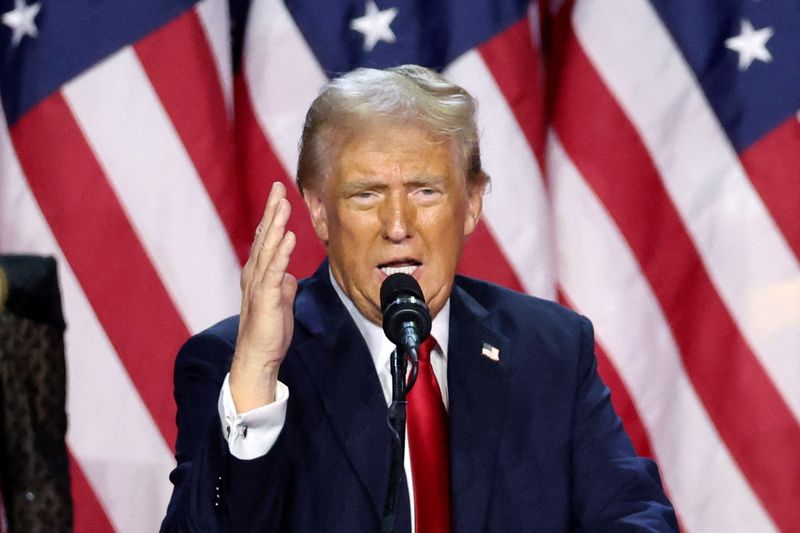By Lewis (JO:LEWJ) Krauskopf and Amanda Cooper
NEW YORK/LONDON (Reuters) -Donald Trump's victory in the U.S. presidential election unleashed a massive rally in the dollar, drove stocks to record highs and punished bond prices as expectations of tax cuts and tariffs on imports drove optimism about economic growth while fueling worries about inflation.
U.S. equity indexes soared, with the benchmark S&P 500 up 2.51% to a record high and huge gains in areas such as small-cap stocks and banks that are poised to benefit from Trump's expected lighter regulatory touch.
The dollar hit its highest level in over four months. Bitcoin hit record highs and Treasuries were battered.
"Everywhere you look, there's the thumbprints of these election results for markets," said Paul Christopher, head of global investment strategy at the Wells Fargo (NYSE:WFC) Investment Institute.
Trump's pledges to raise tariffs, cut taxes and slash regulations encouraged investors to dive into a range of assets that looked likely to benefit from such policies.
Markets that could suffer under tougher tariffs bore the brunt of the sell-off. The Mexican peso slumped to its lowest level in over two years while the euro was set for its largest daily drop since 2020.
Currency trading was intense. CME Group (NASDAQ:CME) said by 10 a.m. CT, online trading of the Offshore Chinese Renminbi already had hit $33 billion in notional value, an all-time high. In the same time span, the traded notional value of futures contracts on the Mexican peso was 43% above the average daily volume.
Bolstering confidence in "Trump trades," Republicans won control of the U.S. Senate. Investors were still awaiting results in the House of Representatives, and Republican control would clear the path for Trump's agenda.
The election could have far-reaching implications for tax and trade policy, as well as U.S. institutions, affecting assets globally.
INTEREST RATES SEEN HIGHER
Investors sold U.S. Treasuries, partly on the expectation that higher tariffs would inevitably filter through to consumer prices, but also because Trump's promises on spending could boost government debt levels. The benchmark 10-year Treasury yield rose as high as 4.48%, its highest level in over four months but retreated slightly.
"If he's able to fully implement his agenda, it means bigger deficits, bigger tax cuts, and also, because of tariffs, higher inflation," said David Kelly, chief global strategist at JPMorgan (NYSE:JPM) Asset Management. "The higher inflation and the bigger deficits should push up long-term interest rates."
In stocks, shares of Tesla (NASDAQ:TSLA), headed by Trump supporter Elon Musk, jumped 14.75%. The small-cap Russell 2000 rose nearly 6%, while the S&P 500 banks index jumped 10.68%.
Bitcoin surged to a record high, betting on a softer line on cryptocurrency regulation.
"Trump's win likely means some deregulation, including rolling back banking regulations," BlackRock (NYSE:BLK) Investment Institute said.
Investors started trading early. Retail trading platform Robinhood Markets (NASDAQ:HOOD) had its largest-ever overnight trading session since it introduced that option in May 2023. The company said its total volume was 11 times a typical overnight trading session, with investors flocking to securities that pundits believe are likely to benefit from a second Trump presidency, ranging from Coinbase Global (NASDAQ:COIN) and the iShares Bitcoin Trust ETF to companies owned by Trump and his wealthiest fan, Elon Musk.
The results meant markets gained clarity about the presidency faster than in 2020, when Joe Biden was announced the victor some four days after election night.
"This is an economy that's in good shape as we go into the next Congress and the next administration, and the stock market is reflecting that with the removal of this uncertainty overhang," said Kurt Reiman, head of fixed income Americas and lead of the ElectionWatch at UBS Wealth Management.

Market attention is turning to the Federal Reserve's monetary policy decision on Thursday, with Trump's victory set to potentially put the central bank on a slower and shallower path for interest-rate cuts, should the Republican's plans juice the economy.
"We now expect just one Fed cut in 2025, with policy on hold until the realized inflation shock from tariffs has passed," economists at Nomura said in a note.
